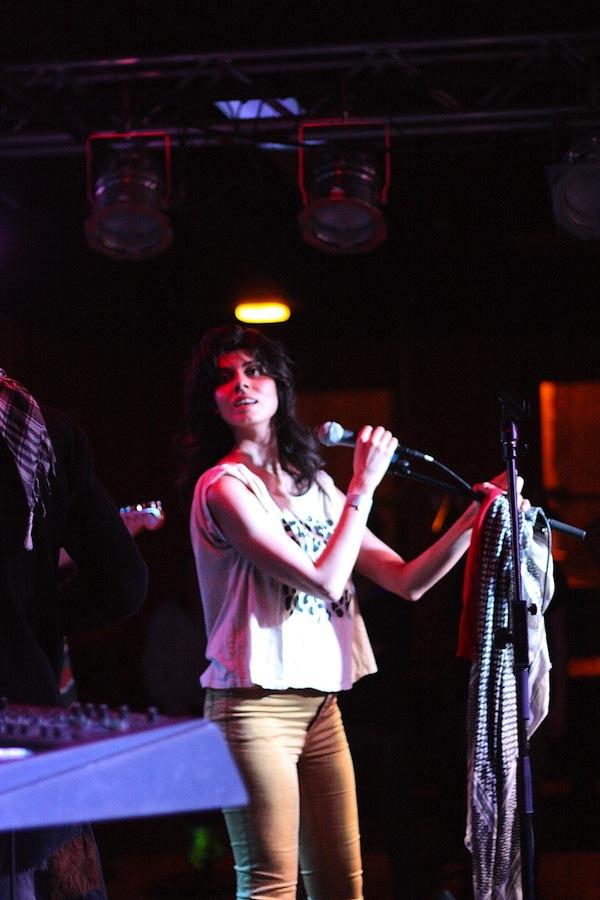’Sco Welcomes ‘Bubu King’: Dancing Not-Optional
Janka kept ‘Sco-goers on their toes last week.
February 24, 2012
Was Oberlin ready for Sierra Leone’s “Bubu” music? You bet.
Thursday night, Sierra Leone native Janka Nabay casually stepped onstage at The ’Sco and looked out onto an empty dance floor. This did not dissuade Nabay, who seemed to know that once the music started, dancing would soon follow. Beginning with what sounded like a soundcheck, an announcement was made to the handful of scattered early attendees and staff: “This is Bubu music!”
Accompanied by a female vocalist, guitarist, bassist, drummer and synthesizer/keyboard player, Janka Nabay and the Bubu Gang launched into what was to be a pulsatory, rhythmic and steadfast set of songs. The room’s atmosphere could be described as a psychedeliccarnívale. Warm synthesizers, a stimulating drum machine and entrancing call-and-response lyrics generated a frenetic dance fest. The buoyancy was contagious; smiles spread throughout the room and remained for the rest of the night. Even the most reluctant Obies could not stop from tapping their feet.
A truly unique blend of traditional West African rhythm and electronic allure, Janka Nabay’s ultimate feel-good music became a source of peace and optimism during the Sierra Leone civil war. The first to officially record the native Bubu music, Nabay has applied his own coat of paint to the musical form, and his widespread popularity has resulted in his appointment as the “King of Bubu.” In place of the traditional flute accompaniment, a pleasantly piercing electric guitar contrasted with grounded, melodious lyrics, written in local languages Krio and Temne with some English mixed in. In one of Nabay’s better-known songs, “Eh Congo,” names such as John Kennedy and America can be made out.
Nabay’s lyrics are didactic in nature, advocating for human rights and peace. Even if the language was not fully understood, the positive messages resonated through the harmonious instruments and repeated choruses. The rhythmic speeds of the drum machine elicited a range of dancing, from steadycha-cha-esque partnerships to solo movers on the cusp of delirium. Yet the persistent beats were enough for even the most free-spirited not to lose their footing.
As the night continued, the music’s energy and pace only increased. In the third of a 10-song set Nabay gave the audience his first set of instructions. Smiling in anticipation, he asked the crowd if they really felt like dancing. Unsurprisingly, they did. “OK! Like this!” Nabay began leading a simple criss-crossing step, emphatically calling out, “One! Two! One! Two!” The crowd, instruments and music were united into a single operating entity.
The music created an atmosphere inside the ’Sco that ranged from that of an intense rain dance to that of an accordion being played underwater. From time to time, Nabay reiterated what no one present would soon forget: “This is Bubu music!” This proved to revitalize the crowd as they responded with hollers and cheers.
Another highlight came from an inevitable chorus of clapping, as the uplifting beat solicited contribution from the audience. At one point, two students were summoned up on stage, one dancing shyly with Mr. Nabay, while the other danced confidently with the female vocalist.
By 11:30 p.m., the show’s apparent peak, the room was filled with over 70 jubilantly dancing attendees. The dancing was stripped of any self-consciousness and was full of a youthful genuineness typically seen of Oberlin students. Yet the real zenith came closer to midnight. The performance had proved good enough for an encore cry from the audience, which was answered with the most dynamic song of the night. Finishing up, the drums and other instruments finally subsided, yielding their musical and spiritual capacity to the crowd. Following the last instructions from Nabay, everyone in the room sang out in unison: “We got to jump, jump, jump, jump, jump. … Ah, we got to live in combination!” The resulting potency rang throughout the ’Sco and remained ringing into the wet Thursday night.





















